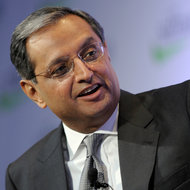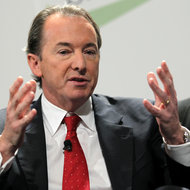Michael Rapino, the chief executive of Live Nation Entertainment, has sold $11.7 million of stock in the company in recent days, representing about 38 percent of his direct holdings, the company revealed in a regulatory filing late Tuesday.
The sales, made on Friday and Monday, apparently came as the company was in the process of dismissing Nathan Hubbard, the president of its Ticketmaster division. News of Mr. Hubbard’s imminent departure — for reasons that are still unclear — emerged on Monday evening.
According to the filing with the Securities and Exchange Commission, Mr. Rapino sold 640,000 of the 1.7 million shares he owned, not counting about 3 million stock options.
Jacqueline Peterson, a spokeswoman for Live Nation, said late Tuesday that Mr. Rapino sold the stock for estate-planning purposes. She said the shares represented a small portion of his total equity stake in the company, including options, and that this was the first time in the eight-year history of the company that Mr. Rapino had sold shares. Live Nation was spun off from Clear Channel Communications in 2005.
Since Live Nation merged with Ticketmaster in early 2010, the company’s stock price has mostly remained sluggish. But it has nearly doubled since the end of last year, when Irving Azoff, its former executive chairman and Mr. Rapino’s chief rival, left the company. The stock closed at $18.19 on Tuesday.
Last year, Mr. Rapino earned a total of $28.5 million from the company, including about $21.6 million in grants of stock and options, according to Live Nation’s most recent proxy report, in April.
Live Nation was believed to be close on Tuesday to signing an agreement terminating Mr. Hubbard’s employment, but the company has made no public statement about it.
In a research note on Tuesday, Ben Mogil, an analyst with Stifel Nicolaus, wrote that the reports of Mr. Hubbard’s departure appeared to be negative for the company because it came in the midst of a revamping of Ticketmaster’s technology platform, and because “it implies that some of the issues at play are personality driven.”

Article source: http://www.nytimes.com/2013/08/15/business/media/live-nation-chief-sells-nearly-12-million-in-stock.html?partner=rss&emc=rss



